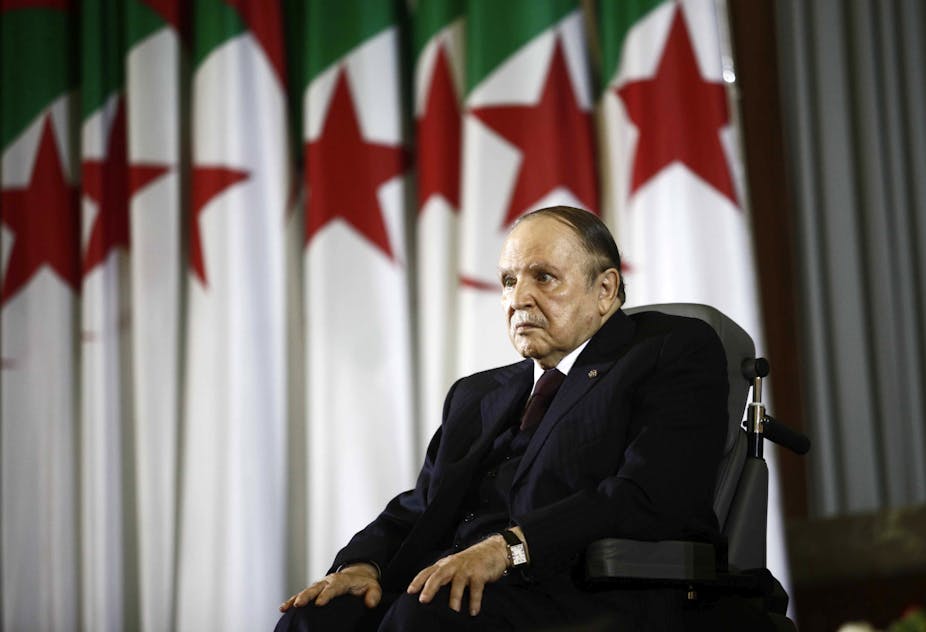The trial was fast and efficient: after only four hours, Algeria’s notorious former counter-terrorism chief Abdelkader Ait-Ouarabi, better known as General Hassan, was unceremoniously sentenced to five years in prison.
This was the country’s first prosecution of a high-ranking secret service officer since the 2011 Arab uprisings, and just the most recent visible sign of a concerted effort to remake the Algerian state – and to finally make good on some still unfulfilled presidential promises.
Elected for the first time in 1999 after a devastating civil war, for many Algerians, President Abdelaziz Bouteflika is still the herald of national reconciliation. He is also the one who famously declared that he would not allow his power to be restricted by the military.
And yet, his first two terms were marked by a de facto alliance with the head of military intelligence, General Mohamed Mediene (also known as “General Toufik”), in which Mediene wielded the real influence. The balance has only begun to shift in the last few years, as a number of key figures in the military and secret service were progressively retired and replaced.
The process has culminated in the discharge of two powerful figures in Algeria’s infamous “parallel state”. First, Hassan was arrested in August, and while grounds for the official charges of “disobeying military orders” and “destroying documents” were not made public, the Algerian press came up with several hypotheses, among them an unauthorised undercover action across the border with Mali. He also ran the special unit, Scorat, which dealt quite controversially with the terrorist attack on the In Amenas oil plant in January 2013.
And in September it was the turn of General Mediene himself, who after 25 years was removed from office and forced to retire. Many feared that such an abrupt dismissal would unleash violent retaliation, but for the moment, there seem to have been no visible consequences.
Blurred boundaries
Some observers see these replacements and trials as part of an effort to promote stronger civilian control of the country’s institutions. But to many other analysts, the weakening of the military doesn’t necessarily mean Algeria is getting any more pluralistic. Instead, it might also point to the growing power of Bouteflika’s clan over the rest of the country.
The clan is backed by an increasingly influential new business class, and by yet another military wing, this one led by General Gaid Salah. That means the “new civilian trend” narrative cannot work as long as Algerian civil society, fragmented by decades of repression, violence, and clientelism, remains too weak to truly counterweight the country’s power elite.
This might also explain why many key figures in the country have reacted to the recent power shift with a mix of surprise and concern.

Longstanding political opponents of Bouteflika still prefer the army to its “civilian” alternative, taking the side of General Hassan. Even the secretary of the workers’ party, Louisa Hanoune, has claimed that the imprisonment of General Hassan would “weaken the military and affect the credibility of the state with foreign allies”.
For an example of just how contorted the effort to “clean up” the state really is, look at the re-emergence of former head of the armed Islamic Salvation Front, Madani Mezrag. Whereas General Hassan, Mezrag’s opponent during the civil war, is now imprisoned, Mezrag is now not only tolerated but even recognised by the government, and often appears in the national media. This and similar cases have the press questioning the secret services’ ability and intention to curb the influence of terrorists old and new.
Managing the crisis
On the surface, it may seem like the Algerian state is playing the same old game, using the spectre of Islamism to justify authoritarian rule. On the other hand, for the last 15 years Algeria has tried hard – and sometimes successfully – to mediate between opposing forces inside and around the country.
Given the general instability across North Africa and the Sahel, declaring open war on all violent Islamist groups might well trigger violent retaliation, such as the In Amenas gas field attacks, which were supposedly payback for Algerian support to France in Mali.
In addition, while most Algerians are deeply disturbed by the advent of new armed Islamist groups, they do not necessarily approve of alliances with Western powers, understandably fearing their destabilising influence in the region. Algerian officials are all too aware of that distrust, and they usually downplay the importance of anti-terrorist alliances with the EU and the US.
There are enormous challenges ahead. Algeria must find a way to better cope with the pressure caused by migrants, who are coming mainly from Mali. A recent fire in the refugee camp in Ourgla resulted in 18 deaths. Then there’s the urgent need to reform the economy and save the country from a dire economic crisis, given that it still relies almost exclusively on oil revenues. And a new financial bill just approved by parliament despite fierce opposition, allows for the privatisation of several state companies, which could be profoundly destabilising without a parallel social welfare strategy.
Since Bouteflika’s poor health keeps him from appearing in public more than once a year, the assorted possible post-Bouteflika scenarios are naturally being discussed. The president’s brother Saïd, who some say is now the real decision-maker, could either step forward personally or continue to promote the clan’s interest behind the scenes.
If a real transition begins, bowing to the pressure from the country’s younger and more educated generations, Algeria could consolidate its role as a crucial mediator in a truly unstable part of the world. The way its government evolves over the next few months will have a major impact on the stability of the whole region – and on the world beyond.

